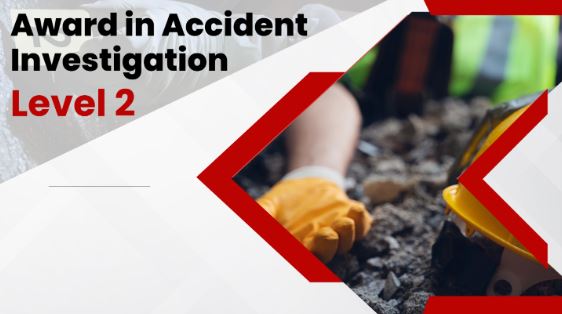
Level 2 Award in Accident Investigation
Course Overview
The Level 2 Award in Accident Investigation is a practical course designed to equip individuals with the skills and knowledge to effectively investigate workplace accidents. This qualification focuses on the core principles of accident investigation, root cause analysis, and the application of corrective actions to prevent recurrence. The course is ideal for employees, supervisors, and safety officers who are responsible for investigating accidents and incidents in their workplace, ensuring a safe and compliant environment. Participants will gain a clear understanding of how to conduct a thorough investigation, compile evidence, and produce reports that contribute to improving workplace safety.
Benefits
- In-Depth Accident Analysis: Learn how to conduct a comprehensive accident investigation and identify root causes.
- Enhanced Safety Culture: Contribute to a safety-first workplace by identifying hazards and taking corrective actions.
- Legal Compliance: Understand the legal requirements and processes involved in accident investigations, ensuring compliance with workplace health and safety regulations.
- Improved Reporting Skills: Gain the ability to create detailed investigation reports, making sure that your findings are communicated effectively to stakeholders.
- Accident Prevention: By identifying the root causes of accidents, participants can help prevent similar incidents from occurring in the future.
Learning Outcomes
By the end of this course, participants will:
- Understand the key principles of accident investigation and its importance in improving workplace safety.
- Be able to identify the factors that contribute to workplace accidents and incidents.
- Master the techniques of root cause analysis and how to apply them to identify underlying causes.
- Gain skills in conducting interviews, gathering evidence, and analyzing accident scenes.
- Be able to create clear, accurate accident investigation reports and suggest corrective actions to prevent future incidents.
Study Units
- Introduction to Accident Investigation
- Understanding the purpose of accident investigations.
- Key concepts: Accident reporting, investigation processes, and legal obligations.
- Identifying Accident Causes
- Different types of accidents and their causes.
- Using investigative tools to identify contributing factors and hazards.
- Root Cause Analysis
- Techniques for analyzing the underlying causes of incidents.
- Methods like the "5 Whys" and Fishbone Diagram for root cause identification.
- Evidence Gathering and Interviewing Techniques
- How to collect physical evidence and statements from witnesses.
- Interviewing techniques for accident investigation.
- Reporting and Corrective Actions
- How to write effective accident investigation reports.
- Implementing corrective actions and tracking the success of interventions.
Career Progression
The Level 2 Award in Accident Investigation offers career progression for those involved in health and safety or risk management, including:
- Health and Safety Officers: Responsible for investigating workplace accidents and ensuring that safety procedures are followed.
- Accident Investigators: Specializing in investigating incidents and analyzing their causes to implement safety measures.
- Risk Assessors: Identifying and mitigating potential risks to prevent accidents and maintain a safe working environment.
- Safety Trainers: Delivering training programs on accident investigation and prevention in workplaces.
- HSE Managers: Leading and managing accident investigations within an organization, ensuring health, safety, and compliance with regulations.
Our assessment process is designed to ensure every learner achieves the required level of knowledge, skills, and understanding outlined in each course unit.
Purpose of Assessment
Assessment helps measure how well a learner has met the learning outcomes. It ensures consistency, quality, and fairness across all learners.
What Learners Need to Do
Learners must provide clear evidence that shows they have met all the learning outcomes and assessment criteria for each unit. This evidence can take different forms depending on the course and type of learning.
Types of Acceptable Evidence
Assignments, reports, or projects
Worksheets or written tasks
Portfolios of practical work
Answers to oral or written questions
Test or exam papers
Understanding the Structure
Learning outcomes explain what learners should know, understand, or be able to do.
Assessment criteria set the standard learners must meet to achieve each learning outcome.
Assessment Guidelines
All assessment must be authentic, current, and relevant to the unit.
Evidence must match each assessment criterion clearly.
Plagiarism or copied work is not accepted.
All learners must complete assessments within the given timelines.
Where applicable, assessments may be reviewed or verified by internal or external quality assurers.
Full learning outcomes and assessment criteria for each qualification are available from page 8 of the course handbook.
Top Courses
No results found.
Related Courses
Let's Get in touch
Deleting Course Review
Course Access
This course is password protected. To access it please enter your password below:



